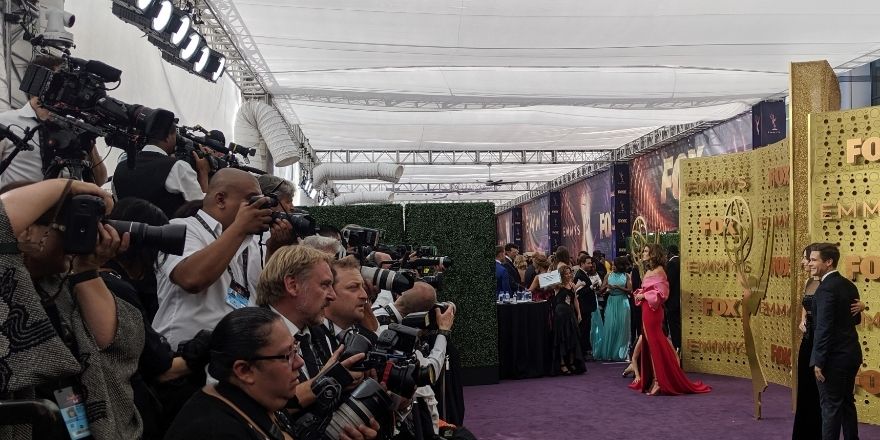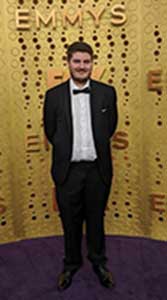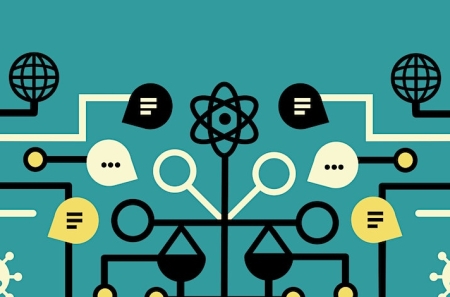
From a degree in Computer Science to the Oscars red carpet
02 November 2020For our first profile, highlighting the interesting jobs a computer science degree can bring you we sat down with Darren Britton, a TU Dublin graduate working for Shutterstock, to find out more about how he went from computer science to the red carpet.
Computer Science Profile Series
Through this series of interviews with early career computer science graduates, the Royal Irish Academy Engineering and Computer Sciences committee aims to highlight the interesting and varied jobs a computer science degree can bring you.
Interview 1: Darren Britton
What motivated or inspired you to study computer science or engineering?
From a very young age, I, and certainly my parents, knew that I'd end up doing something in the field of computers. As a kid I took apart the family computer to build a new one. When we first got dial-up internet, I started reading bulletin boards, learning that I could put more RAM into a computer to make it run a little bit better, making the Lego games I was playing at the time run a little smoother. I was just interested in how things worked.
In secondary school I decided that I wanted to go into hardware. I got this idea, spurred from my passion for hardware tinkering, that I really wanted to design microprocessors. I tried to get an internship at Intel during transition year. They very kindly said ‘this probably isn't something you can do in two weeks, but if you want to do a proper internship at some point get back to us.’ So instead I ended up doing an internship with an electrician, whose son had been studying computer science. He was there for part of the internship and he told me that with computer science, once you get an understanding of the mathematical models that drive computers, you can go off and broaden your career into many different fields using that foundation knowledge from computer science.
How did your studies help you in finding a job?
When we were deciding on final year projects in college, I wanted to do a project on something that we hadn't touched on in any of our modules. I didn't know much about infrastructure and it seemed like it would be useful in pursuing a career as a software engineer. This inspired a project building a platform as a service on top of Docker, which at the time was quite new, in an attempt to demonstrate the pros of virtualisation over containerisation and how that could be leveraged in business to improve development and deployment processes.
Initially I felt a little bit lost, thinking maybe as I wasn't going in a purely academic direction, I wouldn't have ended up with enough to write my thesis paper on. But I was lucky enough to have a fantastic project mentor. I was actually looking for another lecturer and I just bumped into him. We started talking, and he said ‘I don't usually take on a lot of students but your project sounds interesting, do you want to take me on as a mentor?’ Over the mentoring sessions I was able to talk to him about his research and got to see many facets of the application of computer science I had not considered. For example, he was studying satellite and telescope imagery, attempting to identify potential stars thought to have promise for sustaining life, which of course was super interesting. This exposure was an excellent complement to the traditional career paths generally presented as avenues of employment for a computer science graduate.
I ended up spending quite a bit of time on the project because I found it interesting and I won the Luan O'Carroll award from the business software company, SAP Ireland. The award is named in honour of a former high-achieving DIT graduate who was working as a software architect at SAP when he suddenly passed away. This was a huge honour, and as a result of winning I went to SAP for an interview. I got a great initial impression from everybody there. Their reverence for their former colleague was profound and gave a real sense of what it meant to be part team that extended far beyond the four walls of the workplace. This led to me accepting a job offer, which meant I started working within two weeks of finishing my exams.
Tell us about your career since finishing your studies?
At SAP I was a ‘user experience’ or UX developer, initially working on mostly front-end web development, expanding to Node.Js based microservice development after the first few months. The highlight of my time at SAP was leading a project as a junior engineer that enabled communication between a set of microservices. We ended up building something between a rules engine and a task completion system for communicating between these microservices and doing distributed job aggregation. It was really interesting and it definitely exposed me to a lot of new technologies that I had not worked with before.
I was working with one expert developer who had been a mentor the entire time I worked at SAP. He seemed very happy to see me lead a project and gave me all the support that I needed to really create the basis for this new microservice. I also got to lead a front-end project to develop a mobile web app for uploading and viewing low-fi prototypes The core product we worked on was not the typical sort of business software solution that you might associate with a business software company like SAP. It was a user-research tool with a set of Web Apps essentially for prototyping and deploying internal web apps as solutions to business-critical problems.
Tell us about your current role? Shutterstock is a leading global technology company offering a creative platform for high-quality content, tools and services. It started as an eCommerce business to sell stock photography—a two-sided marketplace where anybody could submit their images on the site and then collect a commission whenever it was licensed for royalty-free use. I’m part of the software engineering team that oversees the editorial products and services. We build the software that allows us to ingest content from our contributors, along with the tools that allow our own editors to curate and enrich that content. We also build the systems that support the delivery of this content, either directly to our clients via API or FTP or through our editorial ecommerce and enterprise web sites. Editorial assets such as photographs often come with complex restrictions that define who we can sell an asset to and when. To handle this, we have built an advanced and highly performant graph-based restrictions engine, which was shortlisted in 2019 for an innovation award.
Shutterstock is a leading global technology company offering a creative platform for high-quality content, tools and services. It started as an eCommerce business to sell stock photography—a two-sided marketplace where anybody could submit their images on the site and then collect a commission whenever it was licensed for royalty-free use. I’m part of the software engineering team that oversees the editorial products and services. We build the software that allows us to ingest content from our contributors, along with the tools that allow our own editors to curate and enrich that content. We also build the systems that support the delivery of this content, either directly to our clients via API or FTP or through our editorial ecommerce and enterprise web sites. Editorial assets such as photographs often come with complex restrictions that define who we can sell an asset to and when. To handle this, we have built an advanced and highly performant graph-based restrictions engine, which was shortlisted in 2019 for an innovation award.
As an engineering team, we all work full-stack, with every software engineer contributing to the vast service stack that allows all this to happen at scale and with the consistency our customers expect. This results in a website and platform for delivering the latest editorial images to clients automatically as soon as they're published, so they can be used for the latest breaking news.
Another aspect that I've picked up in the last year is doing live event coverage. When there's an event like the Oscars, the Grammys, or the Golden Globes we send some of our editors and staff photographers - photographers who are exclusive to Shutterstock - to capture the event live.
The photographers show up, get their media credentials and stand at the end of the red carpet to capture the event live. The best way to handle the workflow would be for the photographers to upload their images over a very fast internet connection, these would then be edited offsite and uploaded to our website. But in reality the events tend to happen in locations where the only access to large amounts of bandwidth is prohibitively expensive. To combat this we deploy the photographers and the editors on site along with our own network’s infrastructure and custom on-site hardware and software.
I’ve been lucky enough to have the opportunity to lead some of these events. In 2019, I attended the Oscars, the Emmys and the BAFTAs. In January this year I was in LA for three weeks, working at the Critics’ Choice awards, the Screen Actors Guild awards, and the Golden Globes.
It's crazy how quickly things come together at these events. You arrive on site for an event on Sunday at 7:00 a.m. and nothing is ready, the venue is really just a shell. It's incredible the effort that goes into getting everything together; the digital audio-visual systems, the projection, the miles and miles of cabling run for TV and networking. All of these technical aspects come together very quickly for an event that will only last for a few hours, and then it all disappears in the time it takes our editors to perfect the final winners’ shots.
How do computer scientists work alongside other disciplines in your present work?
Professional photographers and editors are seriously impressive to observe. The insanity that happens at events like these is not seen on TV, mostly because they purposely don't show the photography pen. It's sometimes a group of 50 photographers squeezed into a tiny space and all screaming to get the celebrity to look at them so they can get the shot that sells. For the Grammys red-carpet arrivals, it’s six hours non-stop, the entire time on their feet with heavy cameras and lenses hanging off them, and then some of them go on to shoot the awards show and the winners with little to no breaks.
We have a lot of clients that are major media outlets. With these clients you need to have strong communication to find out what kind of content they want, because the composition of the images changes the appeal of a story and how it is received.
But more often than not it's the speed that an image can be supplied to a client, more than the quality that is important, so time-to-market is really critical. The first image they get of Billie Eilish receiving her first Grammy is the first one they’re going to publish. So, the five seconds it takes to download an image and edit it in Photoshop are critical. Our editors work incredibly fast to account for this.
What do you think makes a good computer scientist?
I think it's someone who just wants to learn; the desire to find out more I think is something I've spotted a lot, particularly in the people who have inspired me to get to where I am today. Computer Science is such a deep rabbit hole to jump into. Determination to keep learning more and more is key, because it's an industry where everything is always changing. Being willing to spend some of your personal time to learn about things, to read research papers, to keep yourself up with modern development methods is important.
What advice would you give aspiring computer scientists on how to get the best out of their degree?
The openness to really commit yourself to the course and go to all the lectures. Go to all the labs and ask questions. As long as you're involved, then you're learning. That's kind of the best way to get as much from the various modules involved, and I think that goes for all college students.
How are your computer science studies playing a role in your current work?
Towards the end of my studies I picked the Artificial Intelligence (AI) and Machine Learning(ML) stream. We had this fantastic lecture talking about things like deep learning and how that is affecting the industry - How it's being democratised so that now almost any developer can build a simple classifier, or retrain the last layer of a model to solve really interesting problems. At a hackathon in work, I developed a novel solution using just these methods. Creating various classifiers that can assist our editors and onsite workflows has shown some potential to further decrease our time-to-market. This stuff is really fun, and it's so important to get involved in these hackathons and different projects that push you a little bit more.
What are your plans for your future career?
I'm not a fantastic conversationalist or people person, so I might struggle managing a team. But I'd certainly like to keep going as a developer. At this point I’m along for the ride, just to see how development methodologies and AI/ML are going to change over the coming years and what it's going to mean—particularly for interesting areas like image generation, which might change the photography industry massively. Photography is something that I've always been interested in, and that I was lucky enough to find a job that’s allowed me to pursue so many of my interests and get paid for it is great. Shutterstock is a really wonderful place to work, and the editorial engineering team I work with are all an incredibly talented bunch of people that I learn from every day. I look forward to facing new engineering challenges with my team as our industry, and the world, changes.
Interested in featuring in this series?
If you are a recent computer science graduate using your degree in novel ways, we would love to speak to you. For information and to express your interest in being featured, please click here



